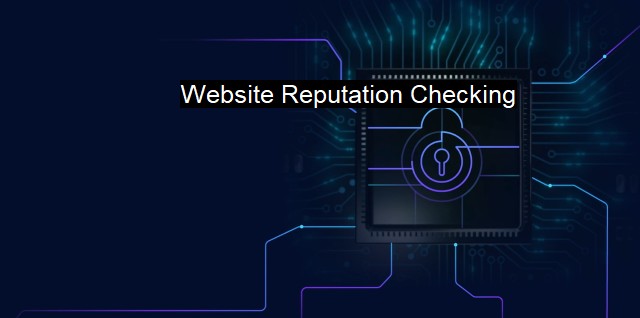What is Website Reputation Checking?
The Importance of Website Reputation Checking in a World of Online Risks: Evaluating Site Safety and Accuracy for Secure Browsing
Website Reputation Checking is a crucial aspect of cybersecurity measures that is often overlooked by users and businesses alike. In the simplest terms, it involves analyzing, monitoring, and evaluating the reputation of a website to ascertain its safety and integrity. In an age where cybercriminals increasingly exploit the internet, causing harm to innocent users and compromising sensitive information, acknowledging this aspect of antivirus and cybersecurity is crucial for safety.The process of Website Reputation Checking is enabled by specially designed services and tools that scan, analyze, and vet the reputation score of a desired URL. They review indicators like website's history, age, previous threats, and safety ratings to declare the website as either secure or harmful. they evaluate the website’s content legitimacy, the adherence to safe web practices, and known interactions with malware or rogueware.
Perhaps, one of the most potent threats in the cyber world is phishing and malware, often hosted on rogue websites. Sometimes, seemingly innocent sites can be laced with hidden threats, such as adwares, ransomware, or sometimes even cryptojacking scripts. Cybercriminals manipulate these sites or create new ones to exploit user's trust and lack of vigilance, thereby causing grave harm such as personal or financial data theft. A proper Website Reputation Check works to alert users about these hidden risks early on by flagging unsafe websites through advanced algorithms and predictive analysis.
Website Reputation Checking is also highly beneficial for businesses. They are more liable to be cyber targets due to the wealth of sensitive information they posses. Addition of commercial wordpress plugins, third-party scripts, or simply visiting an infected client can compromise the entire network. By frequently checking the reputation of websites, they can safeguard their infrastructure and maintain the integrity of their business data, transactions, and customer information.
Website Reputation Checking capabilities are often designed into popular cybersecurity processes. Antivirus solutions often come with URL filtering or Site Rating capabilities, which blacklist or warn against suspicious or untrusted URLs. Advanced cybersecurity platforms have real-time website reputation services that quarantine the user from harmful websites automatically, without relying on human discretion or intervention.
The primary method adopted by most platforms for Website Reputation Checking is leveraging artificial intelligence, machine learning technologies, and vast user community feedback to make real-time threat predictions. These encompass accurate and timely detection of websites exhibiting malicious behavior, spamming behavior, phishing practices, disruptive adware presence, and more. Thus, they provide a robust shield against current and emerging cyber threats and work to continuously improve web safety standards with evolving technologies.
While Website Reputation Checking is indeed a potent tool it is vital to remember that it is not foolproof. Users must regularly update and augment these safety measures with ethical net practices such as avoiding suspicious emails, refraining from downloading unverified software, regularly updating system software, and more.
Website Reputation Checking is an essential aspect of a comprehensive cybersecurity and antivirus strategy. It offers a preventative approach to cybersecurity, empowering users and businesses alike to enjoy the digital space without undue risks. It continues to evolve with ever emerging threats and new-age AI technologies, aiming to enshrine a safer and more secure internet for all. Given the broad array of threats we navigate in the cyber world, acknowledging and adopting Website Reputation Checking service could make the pivotal difference between maintaining a secure cyber-experience and falling prey to cybercriminals.

Website Reputation Checking FAQs
What is website reputation checking?
Website reputation checking is the process of evaluating the trustworthiness and safety of a website by analyzing its security features, domain age, content, and other parameters. It helps to detect potentially harmful or malicious websites that can compromise user data and devices.Why is website reputation checking important for cybersecurity?
Website reputation checking is essential for cybersecurity as it helps to prevent users from accessing potentially dangerous sites that can harm their device or steal their sensitive information. It also helps to detect phishing websites that try to impersonate legitimate ones and trick users into sharing their confidential data.How does website reputation checking work?
Website reputation checking works by analyzing various factors, including domain age, SSL certificate, IP address, hosting server, website content, and external links. The analysis is performed by using specialized tools and techniques that scan and evaluate the website's security features and history. Based on the analysis, the website is assigned a reputation score that indicates its level of trustworthiness and safety.What are the benefits of using website reputation checking tools?
Website reputation checking tools provide several benefits, including enhanced cybersecurity, improved user safety, and reduced risk of data breaches. These tools help to detect potentially harmful websites and warn users before they access them. They also provide real-time alerts and notifications to help users stay updated on the latest threats and vulnerabilities. Moreover, website reputation checking tools are easy to use and can be accessed from any device with an internet connection.| | A | | | B | | | C | | | D | | | E | | | F | | | G | | | H | | | I | | | J | | | K | | | L | | | M | |
| | N | | | O | | | P | | | Q | | | R | | | S | | | T | | | U | | | V | | | W | | | X | | | Y | | | Z | |
| | 1 | | | 2 | | | 3 | | | 4 | | | 7 | | | 8 | | |||||||